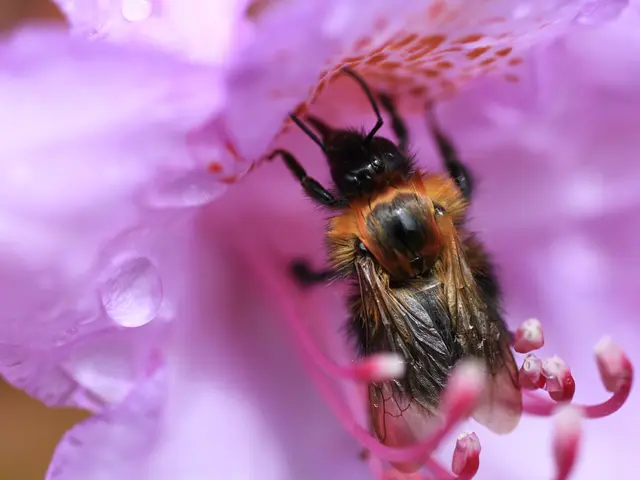Lab Experiments Reveal Shrinking of Aggressive Brain Cancer with Cannabis Use
Hot off the press! You won't believe this breakthrough in cancer treatment. Researchers at St George's, University of London are shaking things up with their latest findings, suggesting that cannabinoids (found in cannabis) could radically improve outcomes for patients fighting the aggressive and typically fatal brain cancer, glioma.
Mind-blowing, right? Here's the scoop on what they found.
When paired with radiotherapy, cannabinoids slowed tumor growth in mice, and in some cases, even stopped it completely. This discovery could revolutionize cancer treatment, offering a lifeline to glioma patients facing a dismal 10% five-year survival rate.
But let's dive deeper into the details.
Cancer Research's Game-Changer?
The study, published in the journal Molecular Cancer Therapeutics, focused on the effects of tetrahydrocannabinol (THC) and cannabidiol (CBD), the two most famed cannabinoids, on glioma cells in lab settings and live mice models.
Research leader, Dr. Wai Liu, and his team tested four treatments: no treatment (control group), cannabinoids alone, radiotherapy alone, and a combination of cannabinoids and radiotherapy.
And the results? The most significant tumor reduction occurred when cannabinoids were used alongside radiotherapy. In some cases, tumors shrunk dramatically, while others disappeared entirely in treated mice.
Dr. Liu was optimistic, stating, "These results are incredibly exciting. Patients with glioma desperately need new treatment options, and these findings suggest that cannabinoids could enhance the effectiveness of radiation therapy, potentially leading to better outcomes."
Debunking Assumptions about Cannabis
For a long time, opinions have been divided about cannabis. While some champion its healing potential, others dismiss it as an unsubstantiated alternative remedy. This study challenges the common notion that cannabis is only beneficial for pain relief and symptom management in cancer patients. Instead, it suggests that cannabinoids could play a pivotal role in treating cancer itself.
This isn't the first study pointing in this direction. Previous research hinted that cannabinoids might induce cell death in certain tumor cells, but studies on brain cancer have been scarce. The hard-to-treat nature of glioma, which often resists traditional therapies, makes this discovery particularly significant.
The Interplay of Cannabinoids and Brain Tumors
The secret behind cannabinoids' effectiveness against glioma lies in their interaction with the body's endocannabinoid system, a complex network of receptors found throughout the brain and nervous system. Both THC and CBD bind to these receptors, triggering a series of effects that can slow tumor growth, prevent cancer cell division, and even induce cell death.
Key findings from the study include:
- THC and CBD killed about 50% of glioma cells at high doses when used alone.
- A lower dose of each cannabinoid, when combined, achieved the same tumor-killing effect, reducing the risk of psychoactive side effects from THC.
- When THC and CBD were followed by radiotherapy, the treatment stopped tumor growth entirely in some cases.
- MRI scans of treated mice showed significantly smaller tumor volumes compared to untreated subjects.
This indicates that cannabinoids might sensitize glioma cells to radiation, making them more vulnerable to treatment.
The Road Ahead: From Lab to Human Trials
While the results are promising in mice, the real test lies in whether similar effects can be achieved in humans. Dr. Liu's team is currently exploring the possibility of clinical trials to determine if the combination of cannabinoids and radiotherapy could be a viable treatment for glioma patients.
However, several hurdles remain, such as regulatory challenges, finding the right balance of THC and CBD, and understanding long-term effects. Despite these challenges, the growing interest in cannabis-based cancer therapies is promising. If trials confirm the results, patients may soon have access to treatments that enhance radiation therapy's effectiveness, reduce tumor growth, and potentially improve survival rates.
For now, glioma patients shouldn't swap out standard treatments for cannabis. Yet, these findings pave the way for a future where cannabinoids become a standard component of cutting-edge cancer treatment.
So, what's up next? With groundbreaking research like this, cannabis is proving to be more than just a pain management tool. It could soon be recognized as a powerful weapon against aggressive cancers like glioma as we continue to unlock its untapped potential in cancer treatment. Stay tuned!
- The study suggests that cannabinoids, particularly cannabidiol (CBD), could enhance the effectiveness of radiation therapy in treating cancer, especially for patients with the aggressive brain cancer, glioma.
- In the study, when paired with radiotherapy, cannabinoids were found to slow tumor growth in mice, and in some cases, even stopped it completely, hinting at a potential lifeline for glioma patients with a dismal 10% five-year survival rate.
- The findings challenge the common notion that cannabis is only beneficial for pain relief and symptom management in cancer patients, suggesting that cannabinoids could play a pivotal role in treating cancer itself, particularly brain cancer.








